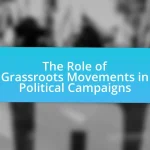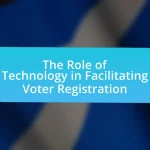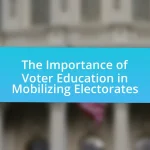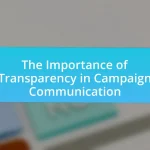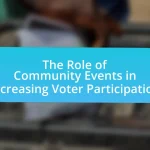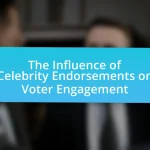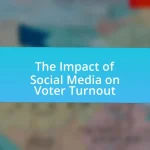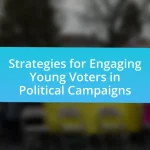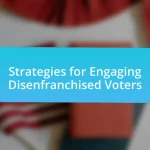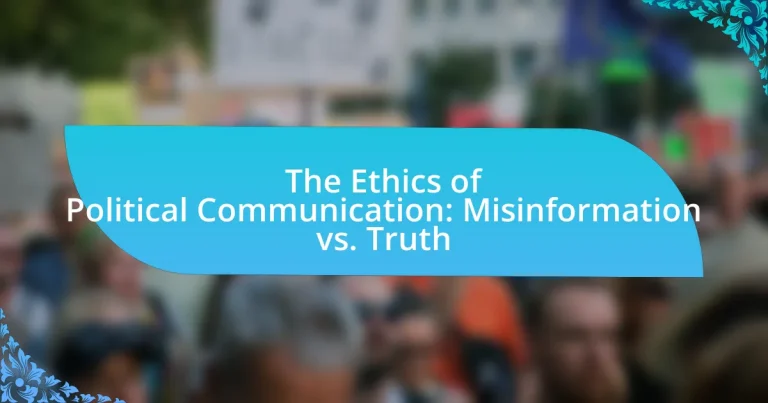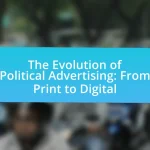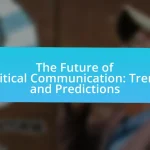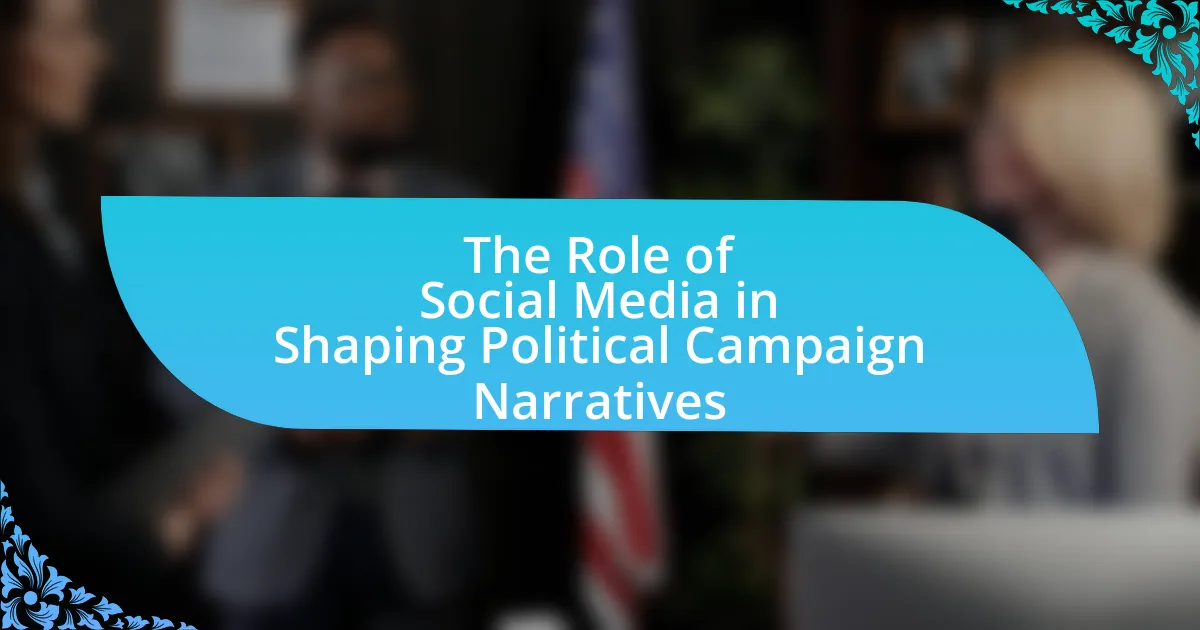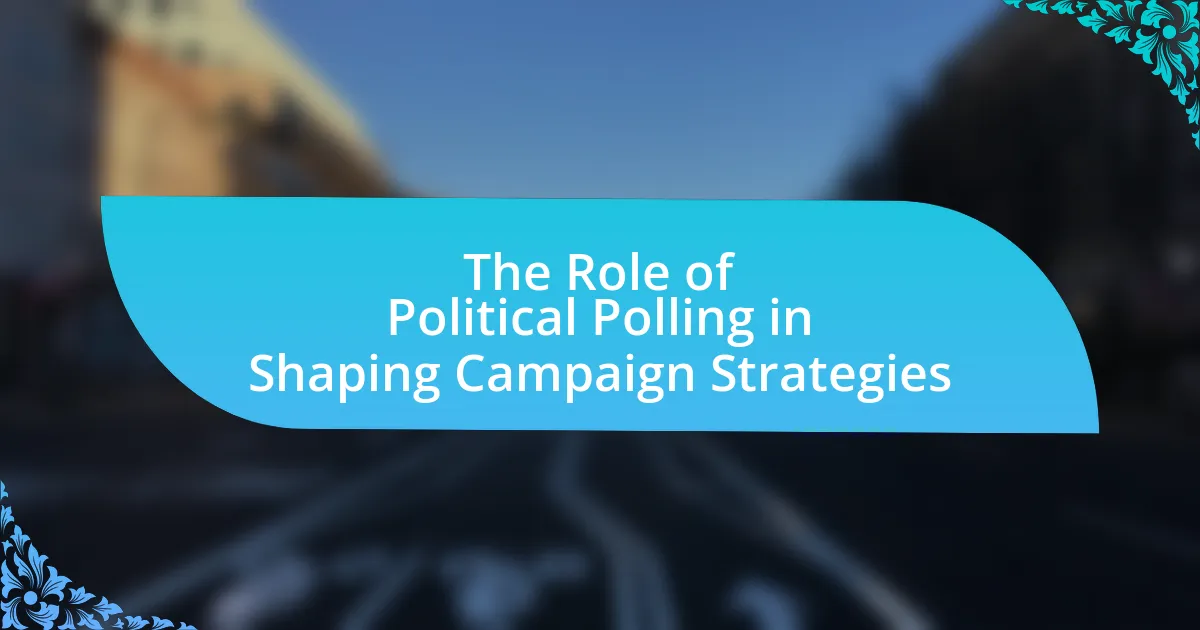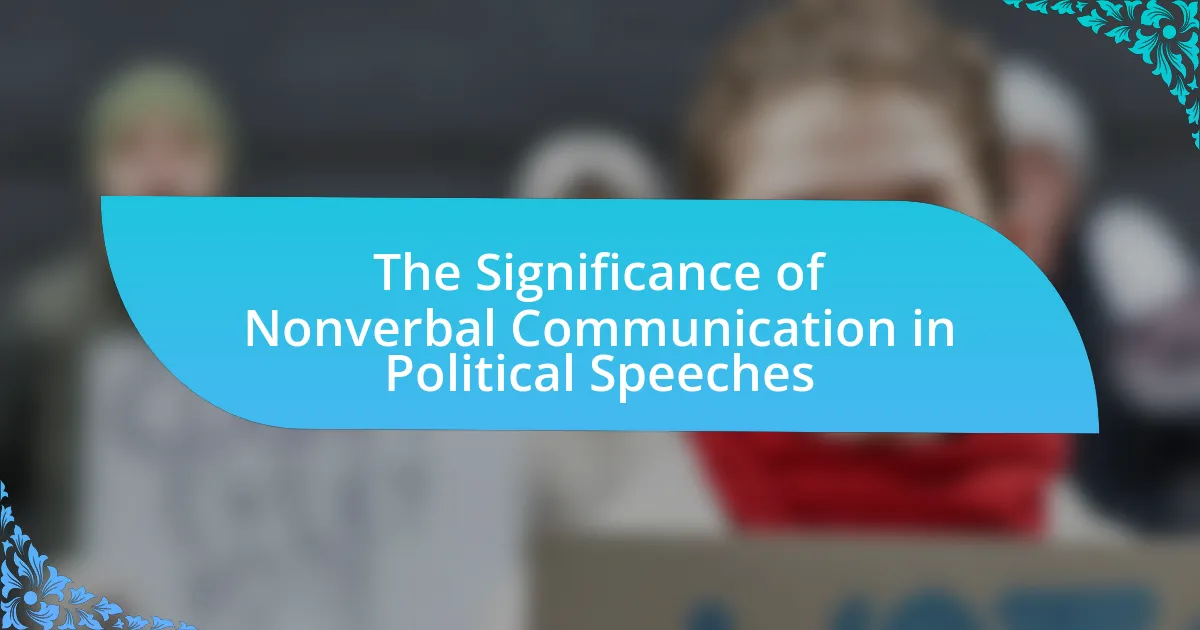The article examines the ethics of political communication, focusing on the critical distinction between misinformation and truth. It outlines the principles that define ethical political discourse, such as honesty, transparency, accountability, and respect for the audience. The discussion highlights the importance of ethical communication in fostering public trust and informed citizenry, while also addressing the detrimental effects of misinformation on democratic processes. Additionally, the article explores the role of political actors, social media, and educational initiatives in promoting truth and combating misinformation, ultimately emphasizing the responsibilities of communicators to uphold ethical standards in political messaging.
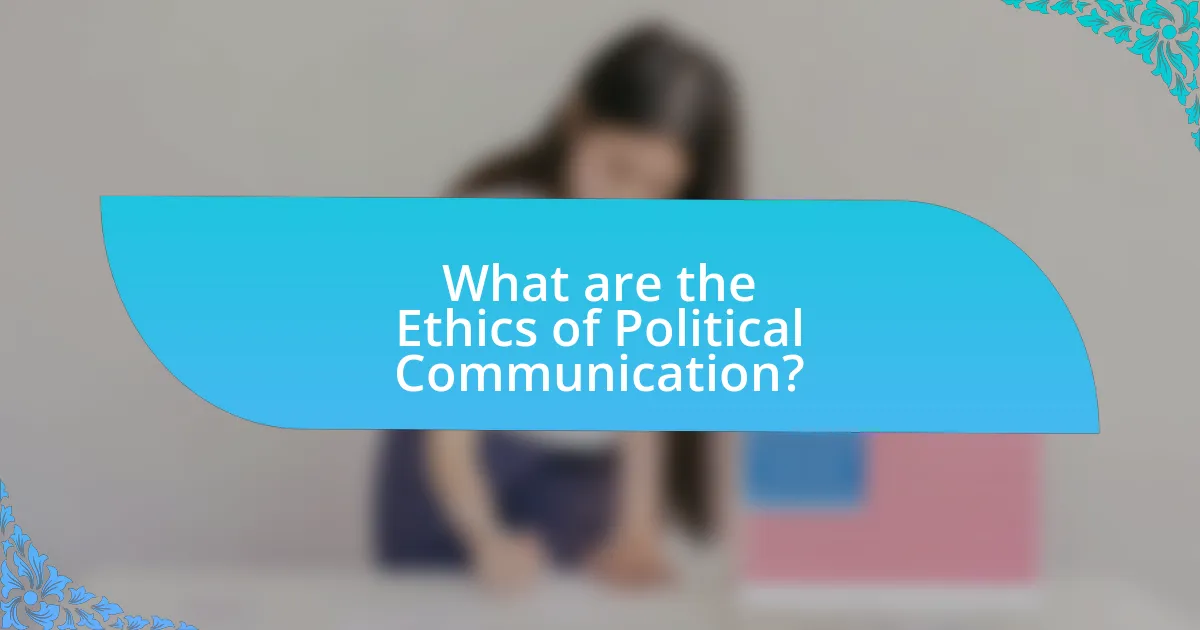
What are the Ethics of Political Communication?
The ethics of political communication involve principles that guide the conduct of political discourse, emphasizing honesty, transparency, and accountability. Ethical political communication requires that information shared by political actors is accurate and not misleading, as misinformation can undermine democratic processes and public trust. For instance, the American Political Science Association highlights that ethical standards in political communication are essential for fostering informed citizenry and promoting fair political competition.
Why is ethical communication important in politics?
Ethical communication is crucial in politics because it fosters trust and transparency between political leaders and the public. When politicians engage in ethical communication, they provide accurate information, which helps citizens make informed decisions. For instance, a study by the Pew Research Center found that 70% of Americans believe that honesty in political communication is essential for a functioning democracy. This trust is foundational for civic engagement and participation, as citizens are more likely to engage in the political process when they feel confident that they are receiving truthful information. Furthermore, ethical communication helps to combat misinformation, which can undermine democratic processes and lead to polarization.
What principles define ethical political communication?
Ethical political communication is defined by principles such as honesty, transparency, accountability, and respect for the audience. Honesty requires that political messages are truthful and not misleading, as evidenced by the ethical standards set forth by organizations like the Society of Professional Journalists, which emphasizes the importance of accuracy in reporting. Transparency involves openly sharing information about sources and motivations, which fosters trust between communicators and the public. Accountability means that political communicators must take responsibility for their messages and their impact, as highlighted by the increasing calls for fact-checking and correction of misinformation in political discourse. Lastly, respect for the audience entails acknowledging their intelligence and right to make informed decisions, which is crucial in maintaining a healthy democratic process.
How do ethical standards vary across different political systems?
Ethical standards vary significantly across different political systems, influenced by cultural, legal, and institutional frameworks. In democratic systems, ethical standards often emphasize transparency, accountability, and the protection of individual rights, as seen in the United States where laws like the Freedom of Information Act promote open government. Conversely, in authoritarian regimes, ethical standards may prioritize state control and propaganda, limiting freedom of expression and manipulating information, as evidenced by the censorship practices in countries like North Korea. These variations reflect the underlying values and power structures inherent in each political system, shaping how ethical communication is defined and practiced.
What role does truth play in political communication?
Truth serves as a foundational element in political communication, as it fosters trust between political entities and the public. When political messages are grounded in truth, they enhance credibility and facilitate informed decision-making among citizens. Research indicates that truthful communication can lead to higher levels of public engagement and participation in democratic processes, as evidenced by studies showing that voters are more likely to support candidates who provide accurate information (e.g., the Pew Research Center’s findings on voter trust). Conversely, the spread of misinformation undermines democratic values, erodes public trust, and can lead to polarization, as demonstrated by the significant impact of false narratives during elections. Thus, truth is essential for maintaining the integrity of political discourse and ensuring a healthy democratic society.
How is truth defined in the context of political discourse?
Truth in the context of political discourse is often defined as the alignment of statements with objective reality and factual accuracy. This definition is critical because political communication relies on the credibility of information to inform public opinion and policy decisions. For instance, the concept of truth in political discourse is supported by the necessity for transparency and accountability, as seen in democratic societies where fact-checking organizations assess the veracity of political claims. Studies, such as those conducted by the Pew Research Center, indicate that misinformation can significantly distort public understanding, highlighting the importance of truth in maintaining an informed electorate.
What are the consequences of prioritizing truth in political messaging?
Prioritizing truth in political messaging leads to increased public trust and informed decision-making. When political leaders and organizations emphasize factual accuracy, they foster a more transparent environment, which can enhance civic engagement and reduce polarization. Research indicates that truthful communication can mitigate the spread of misinformation, as seen in studies showing that fact-checking initiatives significantly decrease the acceptance of false claims among the public. Furthermore, a commitment to truth can improve the overall quality of democratic discourse, as evidenced by the correlation between high levels of political trust and voter participation rates in various democracies.
What is misinformation and how does it manifest in politics?
Misinformation is false or misleading information that is spread regardless of intent to deceive. In politics, it manifests through various channels such as social media, political campaigns, and news outlets, often influencing public opinion and voter behavior. For example, during the 2016 U.S. presidential election, studies indicated that misinformation on social media significantly impacted voter perceptions, with a Pew Research Center report showing that 64% of Americans believed fabricated news stories confused them about basic facts. This demonstrates how misinformation can distort political discourse and undermine democratic processes.
What are the different types of misinformation encountered in political communication?
The different types of misinformation encountered in political communication include disinformation, malinformation, and misinformation itself. Disinformation refers to false information deliberately spread to deceive, such as fabricated news stories or manipulated images. Malinformation involves the sharing of accurate information with the intent to harm, like revealing private information to damage a political opponent’s reputation. Misinformation, on the other hand, consists of false or misleading information shared without malicious intent, such as rumors or misinterpretations of facts. These categories highlight the various ways misinformation can influence public perception and political discourse.
How does misinformation impact public perception and trust?
Misinformation significantly undermines public perception and trust by distorting facts and creating confusion. When individuals encounter false information, they may develop skewed beliefs and attitudes, leading to a lack of confidence in credible sources. Research indicates that exposure to misinformation can result in a 70% increase in the likelihood of individuals doubting the integrity of institutions, as shown in a study published in the journal “Science” by Lewandowsky et al. (2012). This erosion of trust can have lasting effects on societal cohesion and democratic processes, as people become more polarized and less willing to engage in constructive dialogue.
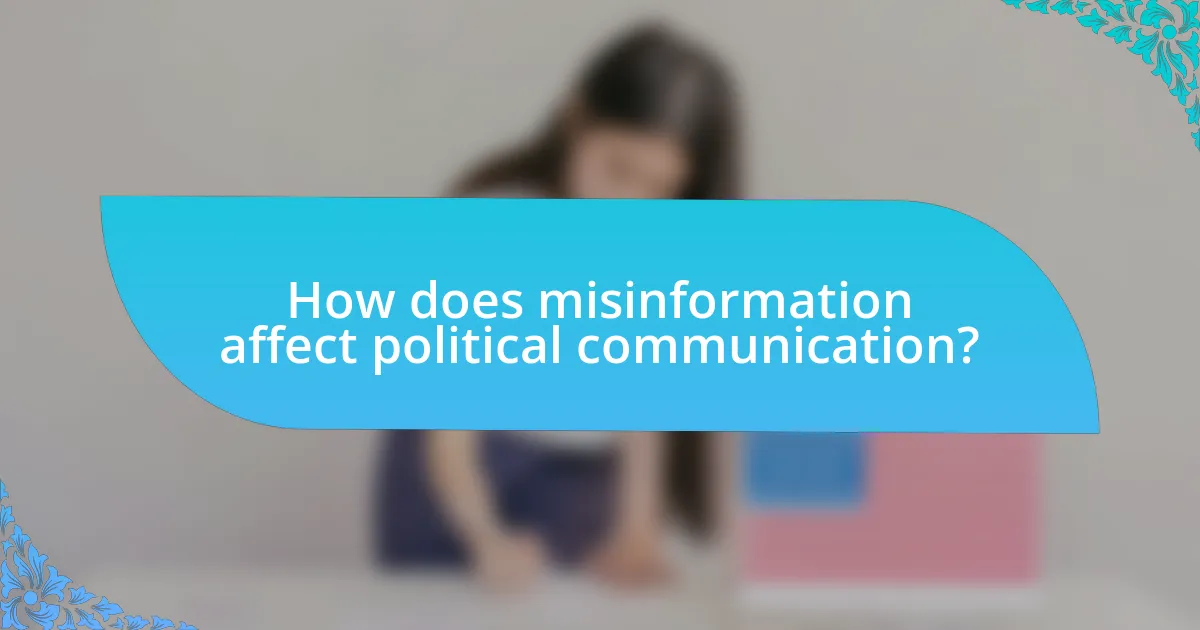
How does misinformation affect political communication?
Misinformation significantly undermines political communication by distorting public perception and influencing voter behavior. It creates confusion and distrust among the electorate, leading to polarized opinions and misinformed decision-making. For instance, a study by the Pew Research Center found that 64% of Americans believe fabricated news stories cause a great deal of confusion about the basic facts of current events. This distortion can result in the spread of false narratives that shape political discourse, ultimately affecting election outcomes and policy decisions.
What are the mechanisms through which misinformation spreads?
Misinformation spreads through several key mechanisms, including social media amplification, cognitive biases, and emotional appeal. Social media platforms facilitate rapid dissemination by allowing users to share content widely, often without verification. Cognitive biases, such as confirmation bias, lead individuals to accept information that aligns with their pre-existing beliefs, further propagating false narratives. Emotional appeal, particularly fear or outrage, captures attention and encourages sharing, making misinformation more likely to go viral. Research indicates that false information spreads faster than true information on social media, as demonstrated by a study published in Science by Vosoughi, Roy, and Aral in 2018, which found that false news stories are 70% more likely to be retweeted than true ones.
How do social media platforms contribute to the spread of misinformation?
Social media platforms contribute to the spread of misinformation by enabling rapid dissemination of unverified content to vast audiences. The algorithms used by these platforms often prioritize engagement over accuracy, leading to sensational or misleading information being shared more widely than factual reporting. For instance, a study by the Massachusetts Institute of Technology found that false news stories are 70% more likely to be retweeted than true stories, highlighting the platforms’ role in amplifying misinformation. Additionally, the lack of stringent fact-checking mechanisms allows misleading narratives to proliferate unchecked, further complicating the public’s ability to discern truth from falsehood.
What role do political actors play in disseminating misinformation?
Political actors play a significant role in disseminating misinformation by intentionally spreading false or misleading information to influence public opinion and political outcomes. For instance, during election campaigns, candidates may use social media platforms to share unverified claims about opponents, which can shape voter perceptions and behavior. Research from the Pew Research Center indicates that 64% of Americans believe fabricated news stories cause confusion about the basic facts of current events, highlighting the impact of misinformation propagated by political figures.
What are the ethical implications of misinformation in politics?
Misinformation in politics raises significant ethical implications, primarily undermining democratic processes and eroding public trust. When false information is disseminated, it can manipulate voter perceptions and decisions, leading to outcomes that do not reflect the true will of the electorate. For instance, studies have shown that misinformation can sway public opinion, as evidenced by the 2016 U.S. presidential election, where false narratives circulated widely on social media platforms, influencing voter behavior. This manipulation not only distorts the political landscape but also poses moral questions about accountability and the responsibility of political actors and media outlets to provide accurate information. The ethical breach lies in prioritizing political gain over the integrity of democratic discourse, ultimately harming the foundational principles of informed consent and autonomy in governance.
How does misinformation undermine democratic processes?
Misinformation undermines democratic processes by distorting public perception and eroding trust in institutions. When false information spreads, it can lead to misinformed voting decisions, as seen in the 2016 U.S. presidential election where misleading social media posts influenced voter opinions. This manipulation of information creates polarization, as individuals become entrenched in their beliefs, reducing constructive dialogue and collaboration. Furthermore, misinformation can delegitimize electoral outcomes, as evidenced by claims of widespread fraud that have been debunked but continue to circulate, undermining confidence in the democratic process.
What responsibilities do political communicators have to combat misinformation?
Political communicators have the responsibility to ensure the accuracy of information disseminated to the public to combat misinformation. This includes fact-checking claims before sharing them, providing context to complex issues, and correcting false narratives promptly. For instance, a study by the Pew Research Center found that 64% of Americans believe that misinformation has a significant impact on public opinion, highlighting the critical role communicators play in maintaining informed discourse. By prioritizing transparency and accountability, political communicators can help foster a more informed electorate and mitigate the spread of false information.
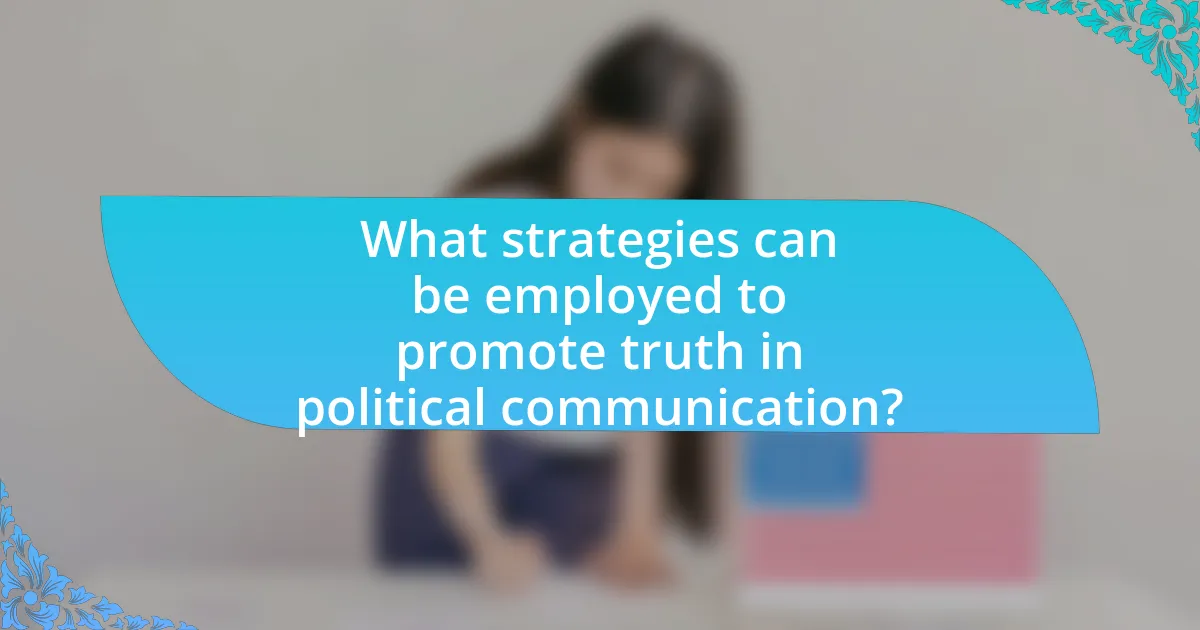
What strategies can be employed to promote truth in political communication?
To promote truth in political communication, strategies such as fact-checking, transparency, and media literacy education can be employed. Fact-checking organizations, like PolitiFact and FactCheck.org, verify claims made by politicians and provide accurate information to the public, thereby reducing misinformation. Transparency in political funding and decision-making processes fosters trust and accountability, as seen in initiatives like the OpenSecrets database, which tracks campaign contributions. Additionally, media literacy education equips citizens with the skills to critically evaluate information sources, as demonstrated by programs implemented in schools that have shown to improve students’ ability to discern credible news from misinformation. These strategies collectively enhance the integrity of political discourse and encourage informed citizen engagement.
How can political communicators ensure accuracy in their messaging?
Political communicators can ensure accuracy in their messaging by rigorously fact-checking information before dissemination. This involves verifying claims through credible sources, such as peer-reviewed studies or reputable news outlets, to prevent the spread of misinformation. For instance, a study by the Pew Research Center found that 64% of Americans believe that misinformation has a significant impact on public opinion, highlighting the necessity for accurate communication. Additionally, employing transparency in sourcing and providing context for statements can further enhance the credibility of the message.
What fact-checking resources are available for political communicators?
Fact-checking resources available for political communicators include organizations such as FactCheck.org, PolitiFact, and Snopes. These platforms provide verified information and analysis on political claims, helping communicators assess the accuracy of statements made by public figures. For instance, FactCheck.org, a project of the Annenberg Public Policy Center, offers nonpartisan reviews of political rhetoric, while PolitiFact employs a “Truth-O-Meter” to rate the truthfulness of claims. Snopes is widely recognized for debunking urban legends and misinformation. Utilizing these resources enables political communicators to uphold ethical standards by ensuring the information they disseminate is accurate and reliable.
How can transparency enhance trust in political communication?
Transparency enhances trust in political communication by providing clear, accessible information that allows citizens to make informed decisions. When political entities openly share their intentions, policies, and decision-making processes, it reduces ambiguity and fosters accountability. For instance, studies have shown that governments that practice transparency, such as the Open Government Partnership, experience higher levels of public trust and engagement. This correlation is supported by research indicating that transparency can lead to decreased perceptions of corruption and increased citizen participation in democratic processes.
What role does media literacy play in combating misinformation?
Media literacy plays a crucial role in combating misinformation by equipping individuals with the skills to critically analyze and evaluate information sources. This capability enables people to discern credible information from false or misleading content, thereby reducing the spread of misinformation. Research indicates that individuals with higher media literacy are more adept at identifying biased or inaccurate information, as evidenced by a study published in the Journal of Media Literacy Education, which found that media literacy education significantly improved participants’ ability to evaluate news sources and identify misinformation.
How can education systems incorporate media literacy into their curricula?
Education systems can incorporate media literacy into their curricula by integrating it as a core component across various subjects. This can be achieved through the development of specific courses focused on critical thinking, analysis of media sources, and understanding the impact of misinformation. Research indicates that students who receive media literacy education demonstrate improved skills in evaluating the credibility of information, as shown in a study by the Center for Media Literacy, which found that 85% of students reported increased awareness of media bias after participating in media literacy programs. Additionally, collaboration with media organizations can provide resources and training for educators, ensuring that the curriculum remains relevant and effective in addressing contemporary issues related to misinformation and truth in political communication.
What are effective strategies for promoting media literacy among the public?
Effective strategies for promoting media literacy among the public include integrating media literacy education into school curricula, conducting community workshops, and utilizing social media campaigns. Schools can implement media literacy programs that teach critical thinking skills and how to analyze media messages, which has been shown to improve students’ ability to discern credible information. Community workshops can engage adults and seniors, providing them with tools to identify misinformation and understand media bias. Additionally, social media campaigns can raise awareness about media literacy, reaching a broader audience and encouraging individuals to question the sources and content of the information they consume. Research indicates that these approaches can significantly enhance individuals’ media literacy skills, leading to a more informed public capable of navigating the complexities of modern media landscapes.
What best practices can political communicators adopt to uphold ethical standards?
Political communicators can uphold ethical standards by ensuring transparency, accuracy, and accountability in their messaging. Transparency involves clearly disclosing sources and intentions behind communications, which builds trust with the audience. Accuracy requires fact-checking information before dissemination to prevent the spread of misinformation, as evidenced by studies showing that accurate information significantly enhances public trust in political messaging. Accountability means taking responsibility for the content shared, including correcting misinformation promptly when it occurs. These practices collectively foster an ethical communication environment that prioritizes truth over misinformation.
How can political campaigns develop ethical communication guidelines?
Political campaigns can develop ethical communication guidelines by establishing clear principles that prioritize honesty, transparency, and respect for the audience. These guidelines should include protocols for fact-checking information before dissemination, ensuring that all claims made during the campaign are verifiable and accurate. For instance, the American Association of Political Consultants emphasizes the importance of integrity in political messaging, advocating for adherence to ethical standards that prevent the spread of misinformation. Additionally, campaigns can implement training programs for staff and volunteers to reinforce the importance of ethical communication practices, thereby fostering a culture of accountability and ethical responsibility within the campaign.
What are the key elements of an ethical political communication strategy?
The key elements of an ethical political communication strategy include transparency, accountability, respect for the audience, and accuracy. Transparency involves openly sharing information about the sources and motivations behind political messages, which fosters trust. Accountability requires political communicators to take responsibility for their messages and their potential impact on public discourse. Respect for the audience entails acknowledging diverse perspectives and engaging in constructive dialogue rather than manipulation. Accuracy is critical, as it ensures that information disseminated is factual and not misleading, which is essential in combating misinformation. These elements collectively contribute to a political communication environment that prioritizes truth and ethical standards.

